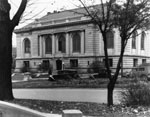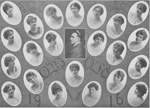Augustana began this period on a high note, with the celebration of its 50th anniversary and the dedication of the new library. A curriculum revision also took place, following a trend of increased interest in social studies and science. Like all colleges, Augustana felt the effects of outside events such as World War I and the influenza epidemic. Student enrollment reached a peak of 244 students in 1916-1917 before declining due to the war. Many Augustana students enlisted, and students and faculty who remained on campus participated in numerous activities in support of the war effort. In 1918, Augustana shut down for four weeks because of the influenza epidemic, during which a number of students and faculty died.
- June 5-15, 1910
- Celebration of the 50th Anniversary of Augustana College and Theological Seminary. The Jubilee includes Augustana's commencement and a Synod celebration. In addition to the usual commencement events, there are celebrations of the 50th anniversary of the Phrenokosmian Society, reports on missionary activities, and celebratory concerts.
- May 31, 1911
- Dedication of Denkmann Memorial Library. The books have already been transferred from their old quarters on the third floor of Old Main to the new library by a chain of students and faculty. The library collection consists of 14,700 volumes and 13,800 pamphlets.
- 1912
- Augustana becomes a member of the North Central Association of Colleges and Secondary Schools and is added to their list of accredited colleges.
- 1912
- First annual year book under the name Rockety-I. The year book is published by the senior class and gets its name from the Augustana College yell: "Rockety-eye! Ki-eye! Ki-eye! Rockety-eye! Ki-eye! Ki-eye! Rah! Rah! Rah! Rah! Rah! Rah! Augustana! Rah! Rah!" Annuals had been published in 1905 and 1910, but these did not bear the Rockety-I name.
- 1914
- Helen Wiggers wins the oratorical competition at the annual state convention of the Prohibition Association with her speech "Prohibition: The Only Hope of a Happy Nation." Wiggers is a student and a member of the Augustana College Prohibition League.
- November 8, 1915
- Eighteen women students meet to form the Oriole Club, a woman's chorus. Their goal is to "promote instruction, sociability, and entertainment of the members." They aim to perform one concert every year.
- 1916
- A revised curriculum is implemented. The new curriculum raises the number of available "groups," or broad areas of study, from six to ten, including modern languages, education, Latin and science, and commerce, among others. The revision gives students greater freedom in choosing subjects and classes.
- 1917
- Football is restored as an intercollegiate sport after many years of student lobbying. The Synod vote in favor of restoring football is 173-171.
- March 20, 1917
- The Augustana Woman's Club is founded by Florence Anderson. Women enrolled in any Augustana College department are eligible to join; the constitution will later be amended to include women faculty members and wives of the faculty. Members of the club are involved in both social and service-related activities.
- April 16, 1917
- The Augustana Band enlists as a body, becoming the 6th Regimental Band of the Illinois National Guard. The 33 members are sent to France. The band, which has been in existence for 43 years, has just completed its first annual tour.
- 1918
- Spanish language classes are added to the modern languages division. Spanish joins French, German, and Swedish as one of the modern languages taught on campus, although it will be some years before advanced Spanish courses are added to the curriculum.



